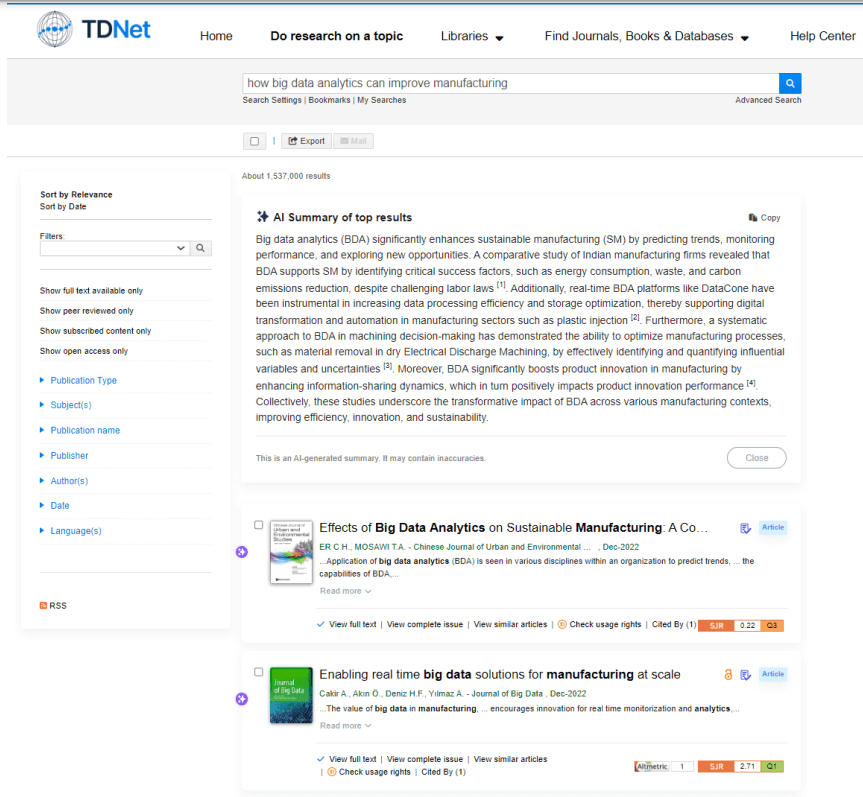
 TDNet AI
Search Smarter
TDNet AI
Search Smarter

Advancing Research Through Comprehensive Discovery
Discover the power of TDNet AI, your key to unlocking a world of knowledge across diverse disciplines. TDNet AI enhances your search efficiency and opens doors to a vast amount of information from leading publishers and content providers on TDNet Discover.
For clinicians and researchers, TDNet AI is more than just a tool—it's a game-changer. It ensures equitable access to the latest research, empowering you to make informed decisions and drive innovation in your field.
Experience the convenience of our single-search solution, designed to streamline your research process, and save valuable time. TDNet AI doesn't just find information; it uncovers hidden connections and brings your library's resources to life.
Whether you're a seasoned researcher or a curious student, TDNet AI adapts to your needs, enhancing the visibility and usability of your library's wealth of resources.

What is TDNet AI?
TDNet AI is an intuitive and intelligent search tool powered by Generative AI that delivers insights with unprecedented efficiency. TDNet AI draws on content included in TDNet Index, a very comprehensive index featuring over 550 million scholarly information resources from a variety of reputable publishers.
By harnessing to power of Natural Language Processing and Artificial Intelligence, TDNet AI allows users to input search queries in everyday language without worrying about specific keywords or Boolean operators. Within the TDNet Discover search box, simply type your query naturally. TDNet AI then identifies relevant results from the TDNet Index, understanding the intent and meaning behind your search.
Additionally, TDNet AI synthesizes key findings from the top search results into concise summaries, complete with references and links to relevant articles. This enhances the depth and speed of information retrieval to an unprecedented level.
Content
The content in TDNet Index is updated daily, ensuring TDNet users have continuous access to the most up-to-date scientific literature. Our vast and comprehensive content coverage makes TDNet a true single-search solution for all research needs.
When TDNet AI generates a response to a search query, it draws on the metadata and abstracts of the following content types included in TDNet index, published since 2014:
- Articles
- Books
- Standards
- Conference Proceedings
We chose 2014 as the start year to ensure that the response you receive is based on recent content. The content includes curated resources in the TDNet index
What sets apart TDNet AI?
While Generative AI tools offer tremendous capabilities, their use in the research and academic environment must be conducted responsibly, transparently and with trust. TDNet AI accomplish these objectives by:
- Grounding Responses in Trusted Sources: TDNet AI bases its responses only on curated resources from leading publishers included in TDNet Index.
- Enhanced Search Results: Leveraging cutting-edge search technology with TDNet’s content-neutral relevance ranking algorithm , TDNet AI delivers results with substantially superior relevancy, quality, and accuracy compared to other search engines.
- Providing Clear References: Each AI-generated summary includes clear references to the original documents, allowing users to easily access the relevant sources, verify the accuracy, and continue their research journey.
- Enhancing User Experience: TDNet AI is designed to optimize the user experience within the familiar TDNet Discover search interface, integrating advanced AI technology with the robust research features that TDNet Discover users rely on.
- Offering Smart Search Enhancements: Beyond improving search results and generating referenced summaries, TDNet AI extracts key terms and subjects within the results to create “smart search facets” and recommend additional search queries, opening new avenues for exploration and learning.
- Protecting User Privacy and Data Integrity: TDNet AI safeguards user privacy and data integrity by implementing stringent legal and technological protections. This ensures zero data exchange with public LLMs and prevents any third-party use of the data.






